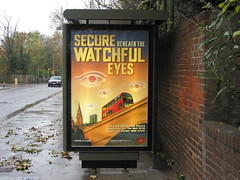 An article in Radical Philosophy (a journal of "socialist and feminist philosophy") looks at the phenomenon of those Keep Calm And Carry On posters, and what the reprinting and near-ubiquitous popularity of a WW2-era propaganda poster that was never originally released says about contemporary British society, alienation from the consumer-capitalist values of Thatcherism-Blairism, and a displaced longing for an imagined utopia of benign paternalistic bureaucracy and modernistic optimism that happened (as all golden ages happen) decades before those contemplating it were born.
An article in Radical Philosophy (a journal of "socialist and feminist philosophy") looks at the phenomenon of those Keep Calm And Carry On posters, and what the reprinting and near-ubiquitous popularity of a WW2-era propaganda poster that was never originally released says about contemporary British society, alienation from the consumer-capitalist values of Thatcherism-Blairism, and a displaced longing for an imagined utopia of benign paternalistic bureaucracy and modernistic optimism that happened (as all golden ages happen) decades before those contemplating it were born.
Initially sold in London by the Victoria & Albert Museum, the poster only gradually became the middlebrow staple it is now when the recession, euphemistically the ‘credit crunch’, hit. Through this poster, the way to display one’s commitment to the new austerity was to buy more consumer goods, albeit with a less garish aesthetic than was customary during the boom. It is in a sense not so different to the ‘keep calm and carry on shopping’ commanded by George W. Bush both after September 11 and when the sub-prime crisis hit America – though the ‘wartime’ use of this rhetoric has escalated during the economic turmoil, especially in the UK. Essentially, the power of ‘Keep Calm and Carry On’ comes from a yearning for an actual or imaginary English patrician attitude of stoicism and muddling through, something which survives only in the popular imaginary, in a country devoted to services and consumption, and given to sudden outpourings of sentiment and grief, as over the deaths of celebrities like Diana Spencer or Jade Goody. The poster isn’t just a case of the return of the repressed, it is rather the return of repression itself, a nostalgia for the state of being repressed – solid, stoic, public-spirited, as opposed to the depoliticized, hysterical and privatized reality of Britain over the last thirty years. At the same time as it evokes a sense of loss over the decline of this idea of Britain and the British, it is both reassuring and flattering, implying a virtuous (if highly self-aware) stoicism in the displayer of the poster or wearer of the T-shirt.The article then mentions a number of other examples of related "austerity chic" or fetishisations of a more high-minded and public-spirited pre-Thatcherite idyll: celebrity chef Jamie Oliver's "Ministry of Food" concept, aesthetic references to Jan Tschichold' Penguin paperback covers, and plates printed with austerely clean images of 1930s Modernist buildings (which the author of the essay links to a reaction against the Blatcherite culture of high-Gini property speculation). One can add to this list a number of other icons. For example, on things like CD covers, the British Rail logo seems to have taken the place of the Mod RAF roundel as an insignia of retro cool, also referencing a pre-privatisation institution remembered more fondly in retrospect to its better-marketed, fare-gouging Blatcherite successors. Perhaps if Rupert Murdoch gets his way, we'll see hipsters wearing BBC logo badges in the not too distant future?
 It's not all benign nostalgia for a kinder, gentler age, though: the article mentions a more sinister edge, from the police force's Keep Calm-esque "We'd Like To Give You A Good Talking To" posters (ironically juxtaposing an attention-grabbing tone of authoritarian brutality with a "caring"official message, which happened, as the author points out, near the harshly suppressed G20 protests) to Ken Livingstone's ironically Orwellian "Secure Beneath Their Watchful Eyes" posters, promoting the comprehensive surveillance society as a beneficial thing. (One is reminded of the "High Security Holiday Resort" posters in Terry Gilliam's Brazil.)
It's not all benign nostalgia for a kinder, gentler age, though: the article mentions a more sinister edge, from the police force's Keep Calm-esque "We'd Like To Give You A Good Talking To" posters (ironically juxtaposing an attention-grabbing tone of authoritarian brutality with a "caring"official message, which happened, as the author points out, near the harshly suppressed G20 protests) to Ken Livingstone's ironically Orwellian "Secure Beneath Their Watchful Eyes" posters, promoting the comprehensive surveillance society as a beneficial thing. (One is reminded of the "High Security Holiday Resort" posters in Terry Gilliam's Brazil.)
I love the word Blatcherite - can't see it enough. Great Banksy photos btw, wish I could have seen the exhibition; social commentary doesn't get much wittier or more cutting.
Regarding gypsy hip-hop, this is probably the best-known example of the genre: http://www.youtube.com/watch?v=tseT9oOd4pY